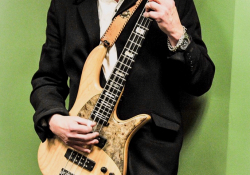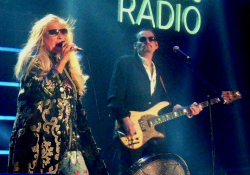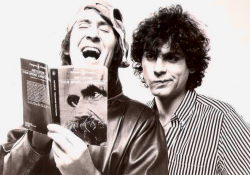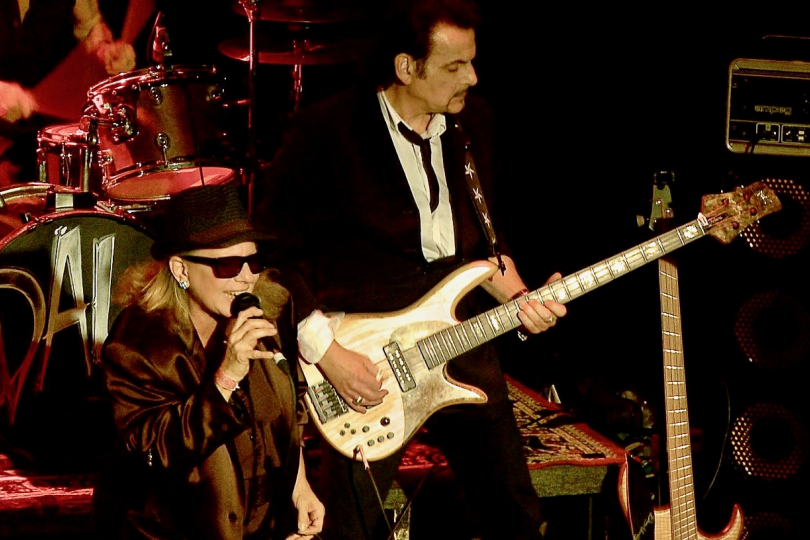
Prescott Niles (the Knack): Music Gives You the Ability to Overcome National and Personal Tragedy
Born in New York City, inspired by the bands of the British Invasion and the Motown sound, Prescott started as a bass player in many Brooklyn bands. The first major change in his life came when he met and recorded an album with singer and guitarist Velvert Turner in 1972. However, the biggest breakthrough for Prescott Niles came in 1978, when he joined power-pop band The Knack, with whom he released the highly successful hit "My Sharona" a year later, which was included on their debut album Get The Knack. He managed to record five more albums with the band until its demise in 2010. This year's Record Store Day sees the release of an unreleased live album, Live At The House Of Blues. Prescott, who can currently be seen in the Missing Persons line-up, discussed his rich and interesting career with us.
The Knack, a live album recorded in 2001 at the House Of Blues in Los Angeles, will be released in April. The concert took place two weeks after the World Trade Center attack. Do you have any special memories of that concert?
I would describe it in the words of Charles Dickens' great novel A Tale of Two Cities, "It was the best of times, it was the worst of times." There never happened anything like that in America, it's hard to explain. I have children, and two of them were there at the time, and I grew up in New York, by the way. To play that night was a great experience for the band. Ironically, about a week later we had a record release party for our then new record Normal As The Next Guy, and while we were partying we turned on the TV and it was on and the war had just started, which kind of put a damper on the whole event. Anyway, I didn't even know they are recording that night. The release has only happened now, many years later.
What was the audience like? Was there any tension? It was still fresh, after all. Or was it that people relaxed to forget for a while?
I was thinking about the comparison with today. I'm playing with Missing Persons at the moment and when we started playing for people again during the Covid crisis, it was in some ways even stranger than it was back in 2001. People were worried about who they were standing next to, who was going to sneeze and stuff, it was very strange. Back then I think people found it easier to lose themself in the music. I don't think the audience was thinking about what happened. And that's the great thing about music and live concerts, it gives you the ability to overcome tragedy, not just national, but even personal. We were thrilled to play.
The set list includes eighteen songs. How did you choose the songs? Did you pick the most popular ones or the ones that are popular with the audience?
It was a very good mix of songs from all of our albums. We included songs that people know best, but also things like "Harder On You," which I had the privilege of composing. I brought that song up during a session with Doug and Berton and we decided to record it. That song will also be one of the singles released before the release of that live album. However, we had no idea at the time that it would one day be a double album. I'm so glad we included a variety of songs, which makes the record more interesting, especially for buyers who don't know our history.
Eight of the songs are from your debut album. The album is full of hits, but it was the song "My Sharona" that made you famous.
And I thought it was our suits. (laughs)
How do you feel about that song today? Do you still like playing it or have you stopped enjoying it?
Besides playing it with The Knack, I used to play it with a lot of different musicians. I have three kids who are now grown up, and we used to play it together as well. You can find some videos of us and the Nelsons playing it together on YouTube. I like listening to "Sharona," I like playing it with different people. The song doesn't get old, I've heard some terrible versions of it, just look on YouTube. There were so many versions of "My Corona" during the pandemic, which made me ill. Me and Berton did a parody of it called "Bye, Corona." The song is still parodied, but I think imitation is a great form of flattery and I guess I have a good sense of humour. Playing that song for years with different musicians makes that song more relevant and not just a one-off song where people get bored of hearing it. Every time I play it, people get excited, which makes me happy.
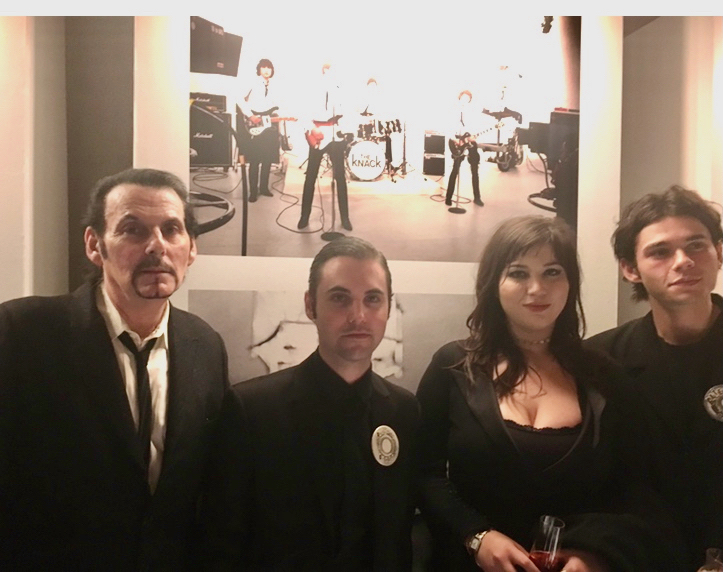
In my opinion, "My Sharona" has everything a power-pop song should have, and it had to be clear from the beginning that it was going to be a hit. Great rhythm, a distinctive bass line and guitar riff, a catchy chorus and of course an amazing solo that is perhaps uncharacteristically long for a pop song.
First of all, I have to say that Berton is one of the best, unsung guitar players. His playing is fantastic. Anyone who has heard our records knows that, especially our third album Round Trip, which was produced by Jack Douglas. Berton's soloing, he can do be-bop solos, jazz, and he's a great rock guitarist. I love Berton, we're still friends and his guitar playing is phenomenal, as was Gary Bruce's drumming.
When the album came out, people heard the album version, but when the single came out, they cut the solo. Unfortunately, a lot of the TV shows we did after that used the shortened version, so people didn't get a chance to hear the extended solo. To me, it's one of the most memorable, if not the most technically difficult guitar solos, especially for a pop band. Musicianship was always important to me. Doug Fieger was a great singer and songwriter. I think those two elements gave The Knack something special, really.
Is it true that the solo was recorded in one take?
You know, unfortunately, people labeled us as a one-hit wonder, which makes me ill. Sometimes I answer that "Good Girls Don't" was in the top 10. A lot of people forget that it was also a hit single. Anyway, rather than being a one-hit wonder, we were a one-take wonder. We basically did a lot of tracks for the first album on the first take; Doug occasionally overdubbed some stuff. We worked with Mike Chapman. He was a hero to us because he was involved in so many great songs, whether it was Slade or Suzi Quatro. Mike was also the one who said "My Sharona" was going to be number one. When we were working on our album, he was still producing Blondie at the same time. We finished the record and Blondie were still working on theirs. (laughs) We were so fast. We recorded "My Sharona" and Mike says: "All right, guys, we got it, let's go." We didn't understand. "This is it, it's fresh, it's live, we're going to use this." Another producer might have asked us to do ten more versions. Mike Chapman knew what sounded good so it wouldn't be overproduced.
You started your musical career before The Knack when you played with Velvert Turner and recorded his debut album with him. How do you remember that collaboration?
I used to play in a blues band in Brooklyn, where I grew up. I wasn't playing for long, but I loved the blues, it was a great way for me to get started. My idols were James Jamerson from Motown Records, McCartney and John Entwistle from The Who. I also loved Cream and Jimi Hendrix. Well, one day Velvert auditioned to be the lead singer. He looked a bit like Jimi, the way he dressed, even though he was taller. After he sang, I asked him where he got those clothes, that I'd never seen anything like them in Brooklyn. And he told me he knew Jimi Hendrix. And I said, "Are you kidding me?" Okay, so I thought maybe we can hang out one day. And about a year later, Velvert called me and we went to see Jimi Hendrix. That was in 1968. Velvert then took me to Jimi's 25th birthday party at the Cheetah Club in Manhattan. Since Velvert knew Jimi, I had the opportunity to see him at least five times, including Woodstock. But every time I met him, I didn't say a word because my lips were frozen, you know. But Jimi was a great guy, he changed everything. He was a great guitarist, performer and songwriter. Many years later we realized that his lyrics were something special.
I was in California when he died, but I came back to New York because people thought Velvert was going to be the next Jimi. He had a record deal with Michael Lang, the promoter of Woodstock, who was starting a new label, and we were the first band signed. We went to California to record an album, but unfortunately, when people expect you to be the second Hendrix, you're not gonna be Jimi Hendrix.
When the album came out, nothing much happened, but a few years later it was re-released in Germany and England, and new people were looking for it. I think the album has stood the test of time. I had the privilege to write a couple of songs on it. People still think it's Jimi Hendrix because of the vocals. But I love the record and I'm excited to talk about it.
And if I may mention, my good friend Harvey Kubernik recently wrote a book called Voodoo Chile. He mentions Velvert in it, and he interviewed me and I had a chance to talk about meeting Jimi and playing with Velvert. It's a great book and if anyone is interested in the subject, check it out.
In the 1980s, you had the opportunity to collaborate with George Harrison on the soundtrack to Shanghai Surprise, starring Madonna and Sean Penn. That film wasn't very successful, but it was obviously a memorable meeting and collaboration for you, am I right?
It was wonderful. The good things for me were that during my time in England in the '70s I met various people, one of whom was Rose, Mick Taylor's wife. She introduced me to interesting people in London that I might never have met in my life. Through Rose, I met and started dating a woman who was a secretary in Derek Taylor's office, who was the publicist for George Harrison and the Beatles as well. We used to go to a private club and I can actually say that before I recorded with George Harrison, I danced with him on the dance floor. That's where I met him, and then a few years later, in the 80s, a producer called me up and told me to come to the session, saying he couldn't tell me who it was for and not to ask any more questions. So I went there, not having any idea that it was going to be a recording session with George Harrison. The fact that I had met George in the past made the whole thing a little easier, but I was still nervous. But the great thing was that George knew The Knack, liked our record and all that. That's where the ice was broken, I wasn't just a guy he met in London, I was a respected artist, to say the least. So it was easier for me straight away. I was even supposed to go to London to make a whole album with George, but the producer who brought me to him was dismissed because George met Jeff Lynne and hired him to make the record with him. I really appreciate the days I got to spend with him.
You use thumb picks when you play bass. When did you discover that they were best for your playing?
Bass players I admire play with both their fingers and a pick. John Entwistle used both. I loved it when he played with a pick on just some of the songs, his finger playing was incredible as well. Jack Bruce was great, Chris Squire was my hero too, I love Yes. I loved the sound of the pick, but I also loved the sound of the fingers. With The Knack, we used to play fast eighth notes and I needed to use the palm mute technique for that. But I liked playing with my fingers in certain parts of the song because it sounds different. So I started using a large thumb pick. I realized that if I got it tight enough on my finger and it didn't fall off, I could mute the strings and play with the pick and then smoothly switch to my fingers. I was the only person I knew who did that. It's become part of my style and I don't have to worry about dropping a pick. I still play that way and I'm surprised more bass players don't take advantage of it. Thanks for noticing that, I appreciate it.
Back in the days of The Knack, you played Guild and Rickenbacker basses. What do you use now? Have you tried a lot of brands during your career, or do you not experiment much?
In New York I was lucky enough to get a Fender Precision 62 at a pawn shop for about ninety dollars, that was in 1969. It's the holy grail of basses and I still have it today. When I was with The Knack, I also had a Rickenbacker and a Gibson Thunderbird. One time we were playing a gig in L.A. and the owner of the club tells me he has a bass he wants to show me, and he says he wants to see if I'd be interested in buying it. I think that maybe it was stolen, who knows. It was a Guild bass and I ended up buying it from him for a hundred dollars. I used to play through a Marshall guitar amp because when you have a 4x12 it gives you more punch. The Guild was the right bass for that. On Get The Knack, I played mostly on that. On That's What The Little Girls Do I played the Hofner, which I still have. On Oh Tara and Lucinda, I played the Rickenbacker. I continue to expand my collection. I was sponsored by Fodera for a while. I think they have some amazing basses. I bought one, then I met the Fodera people and they made me my own, to my liking. I also liked Warwick basses, and I have an Ibanez, and I also have a Kubicki bass, which I don't think you've heard of. They have this option that you can go from E to D with this little system on the neck. I also have a Vox bass like Bill Wyman had. I've collected different basses over the years, each with its own distinct sound. With Missing Persons, I'm using mostly Fodera now. I'm versatile. As far as strings go, I like roundwound. I was endorsed by Rotosound for a while. I like twangy strings, but it depends on what occasion I need them for. I usually put on medium 45-105, but if I want to achieve the James Jamerson sound, I'll use flatwound strings.
What are you currently working on?
I like to play with Gary Myrick, who used to have a band called Gary Myrick & The Figures, with whom he had a few hits in the 80s. I often work with the Missing Persons and have some interesting gigs coming up with them, including a gig at the Good Bye Cruel World event in May with acts like Blondie and lots of other bands. I also play with a young artist called Rocky Kramer. He's a guitar virtuoso, originally from Norway but now living in Los Angeles. He's appearing in a movie now, and I'm also going to play with him on his second record and do some shows with him. He's a younger guy, he's got one album out and his lyrics are really good. It's not typical metal or progressive rock. I like playing with him because he's younger, he has a different audience and I enjoy playing different styles myself.
If you have found an error or typo in the article, please let us know by e-mail info@insounder.org.

